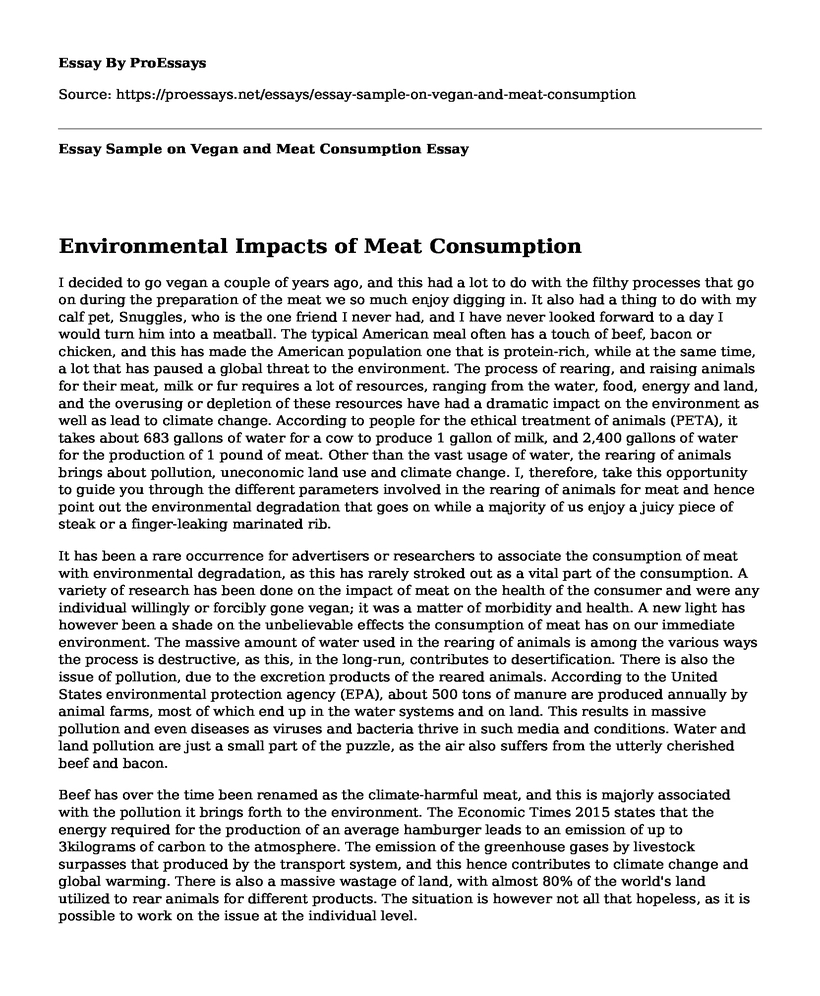Environmental Impacts of Meat Consumption
I decided to go vegan a couple of years ago, and this had a lot to do with the filthy processes that go on during the preparation of the meat we so much enjoy digging in. It also had a thing to do with my calf pet, Snuggles, who is the one friend I never had, and I have never looked forward to a day I would turn him into a meatball. The typical American meal often has a touch of beef, bacon or chicken, and this has made the American population one that is protein-rich, while at the same time, a lot that has paused a global threat to the environment. The process of rearing, and raising animals for their meat, milk or fur requires a lot of resources, ranging from the water, food, energy and land, and the overusing or depletion of these resources have had a dramatic impact on the environment as well as lead to climate change. According to people for the ethical treatment of animals (PETA), it takes about 683 gallons of water for a cow to produce 1 gallon of milk, and 2,400 gallons of water for the production of 1 pound of meat. Other than the vast usage of water, the rearing of animals brings about pollution, uneconomic land use and climate change. I, therefore, take this opportunity to guide you through the different parameters involved in the rearing of animals for meat and hence point out the environmental degradation that goes on while a majority of us enjoy a juicy piece of steak or a finger-leaking marinated rib.
It has been a rare occurrence for advertisers or researchers to associate the consumption of meat with environmental degradation, as this has rarely stroked out as a vital part of the consumption. A variety of research has been done on the impact of meat on the health of the consumer and were any individual willingly or forcibly gone vegan; it was a matter of morbidity and health. A new light has however been a shade on the unbelievable effects the consumption of meat has on our immediate environment. The massive amount of water used in the rearing of animals is among the various ways the process is destructive, as this, in the long-run, contributes to desertification. There is also the issue of pollution, due to the excretion products of the reared animals. According to the United States environmental protection agency (EPA), about 500 tons of manure are produced annually by animal farms, most of which end up in the water systems and on land. This results in massive pollution and even diseases as viruses and bacteria thrive in such media and conditions. Water and land pollution are just a small part of the puzzle, as the air also suffers from the utterly cherished beef and bacon.
Beef has over the time been renamed as the climate-harmful meat, and this is majorly associated with the pollution it brings forth to the environment. The Economic Times 2015 states that the energy required for the production of an average hamburger leads to an emission of up to 3kilograms of carbon to the atmosphere. The emission of the greenhouse gases by livestock surpasses that produced by the transport system, and this hence contributes to climate change and global warming. There is also a massive wastage of land, with almost 80% of the world's land utilized to rear animals for different products. The situation is however not all that hopeless, as it is possible to work on the issue at the individual level.
The earth is our only home, and unless we make it hospitable, no one else will do that for us. It is high time we supplement our protein source from meat to plants. The United Nations Environmental Program presented research on making meat out of plants, whereby, all the nutrients in meat were identified in different plants that could, therefore, be consumed instead of meat. These plants include beetroot, peas, coconut oil and potato starch. Such an initiative would use93% less land, 99% less water, 46% less energy and 90% less emission of greenhouse gases. I take a look at the future, and see a population that will be environmentally literate and conscious, and hence a vegan world. It is, therefore, a call to every individual to cut their losses and join the vegan world, if at all there shall be a world for our future generations.
References
Bagla P. (2015, October 11). Beef eating bad for the environment: experts. The Economic Times. Retrieved from https://economictimes.indiatimes.com/news/science/beef-eating-bad-for-environment-experts/articleshow/49307401.cms
Meat and the environment. People for the ethical treatment of animals (PETA). Retrieved from https://www.peta.org/issues/animals-used-for-food/meat-environment/
Tackling the world most urgent problem: meat. United Nations Environment Program. Retrieved from https://www.unenvironment.org/news-and-stories/story/tackling-worlds-most-urgent-problem-meat
Cite this page
Essay Sample on Vegan and Meat Consumption. (2022, Nov 30). Retrieved from https://proessays.net/essays/essay-sample-on-vegan-and-meat-consumption
If you are the original author of this essay and no longer wish to have it published on the ProEssays website, please click below to request its removal:
- Paper Sample on Vegetarians and Vegans
- Essay on Health Effects of Vegetable Oil
- Did McDonald's Act Ethically in Selling Products That it Knows Causes Obesity?
- Essay on Dieting Effects on Young Children's Brain Development
- Start a Unique Business: Nail Salon & Coffee Shop - Essay Sample
- Essay Example on Healthy Eating: The Benefits of Nutritional Dieting
- Advanced Technologies & Virtual Supply Chains: Essential for Reducing Global Food Waste - Essay Sample







